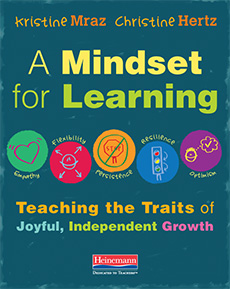Happy Daylight Savings Day! Well today, we officially leap into Spring by moving our clocks forward. For me, this tradition always serves as a metaphor that Spring is officially here and learning needs to get even more serious. As I re-evaluate the first half of the year, knowing that I need to push forward strategically, and with urgency, in the limited number of teaching days ahead. Spring serves as a reminder to continue honing my craft to include the artful balance of goal setting, strategic and explicit teaching while encouraging my learners to continue to embrace the curiosity of learning and keep positive mindsets for the learning challenges ahead.
Beyond nudging students to set goals, we really need to embrace the mindsets that learners have. We can't focus just on learning standards and the CCSS when we set goals. We need to foster a growth mindset mentality that embraces the process of learning, and we can develop that through modeling and directly naming the mindsets that will make students successful learners. So how do we do that? Especially, when Spring brings the demands and urgency of testing and sometimes that restlessness among students so aptly named Spring Fever. How do we continue to captivate and engage even our littlest learners while teaching the habits of mind needed for academic success, a love of learning, and agency in the world?
Well, that question brings me to one of my favorite parts of coaching and writing; it's researching the "how do I do that?” I love the way reading and research can both answer questions and spur you to ask more questions. I’ve been so fortunate to have the opportunity to be trained and influenced by some amazing thinkers and inspirational literacy leaders: Marie Clay, Peter Johnson, Irene Fountas & Gay Su Pinnell, Linda Dorn, Debbie Miller, Carl Anderson, and most notably, Lucy Calkins.
Recently, I am finding my research influenced by some young, but truly talented and inspiring literacy leaders, many who have grown up in the Teachers College Reading and Writing Project Organization: Kate Roberts, Chris Lehman, Jennifer Serravallo, Colleen Cruz, Christine Hertz & Kristine Mraz.
So today I want to share with you a fantastic book, A Mindset for Learning, written by two of these inspiring young educational leaders Christine Hertz and Kristine Mraz. This is a great read to help you launch a grow mindset learning with your students. These two educators/authors have written an amazing book on Growth Mindset. Reading the book, you can see how their work has been influenced by the incredible and aptly titled Mindset by Carol Dweck. To learn more about Dweck and how we can grow our brain's capacity to learn and solve problems watch this Ted Talk on Growth Mindset.
According to Dweck, there are two lenses in which to view the world: a fixed mindset and a growth mindset. Our mindset is NOT genetically pre-determined but rather influenced by, and constructed from, our experiences and interactions with others. As teachers, through our interactions we influence the lives of children daily. We need to help them learn pathways to resilience, perseverance and problem solving. This great read will help you launch growth mindset learning with your students.
So how do we teach the habits of mind needed for academic success, a love of learning, and agency in the world? A Mindset for Learning shows us how.
Drawing on the work of Carol Dweck, Daniel Pink, Art Costa, and others, Kristine Mraz and Christine Hertz show us how to lead students to a growth mindset for school—and life—by focusing on five crucial, research-driven attitudes:
optimism—putting aside fear and resistance to learn something new
persistence—keeping at it, even when a task is hard
flexibility—trying different ways to find a solution
resilience—bouncing back from setbacks and learning from failure
empathy—learning by putting oneself in another person’s shoes
Thanks to Heinemann Publishing for providing us with a sneak peek at a sample chapter!
(Please note none of the links provided in this post are affiliate links)
Lastly, I really hope you'll take a minute to share how you teach the habits of mind needed for academic success, ways you foster the love of learning with your students and/or your thoughts on A Mindset of Learning. Please please please share your questions and thoughts in the comments section below and let's get a conversation going!I can hardly wait to hear from you!
A few people have asked if they need to register to leave comments or if they need a login to post comments. You do not need to register to leave comments and you do not need a login to post comments but you can choose to login with your Facebook, Twitter, Google+ or Squarespace accounts.
Once you type your comment in the comment section box click 'post comment', a pop up box will appear and you can choose to login with your desired social media account OR you need to choose the icon on the far left and just write your name and click the 'login' button. Then your comments will appear! Please let me know if you have any other questions on how to comment in the comment section below.
Happy Reading!


